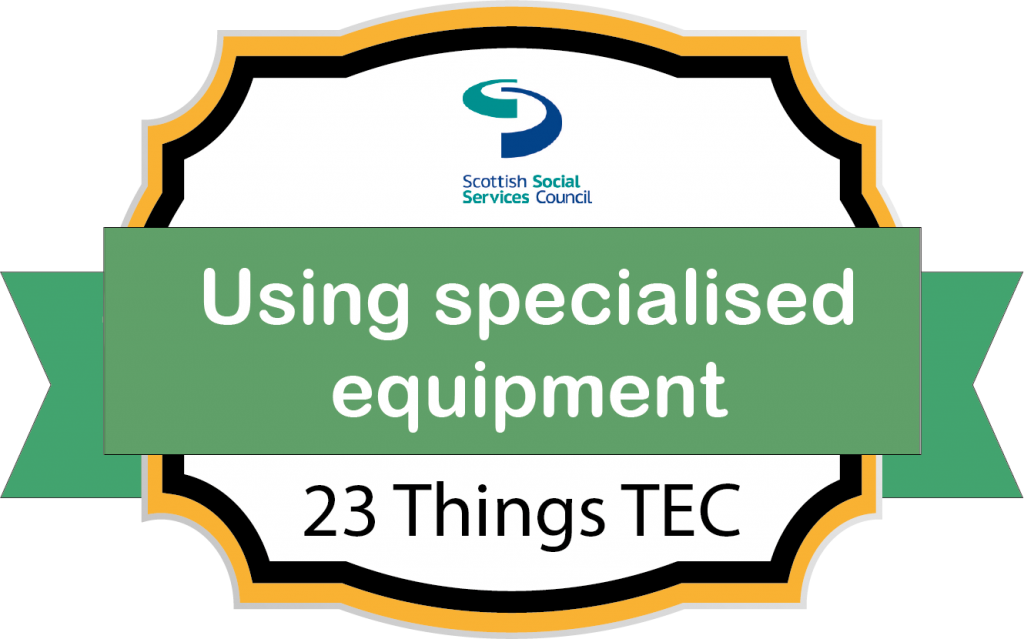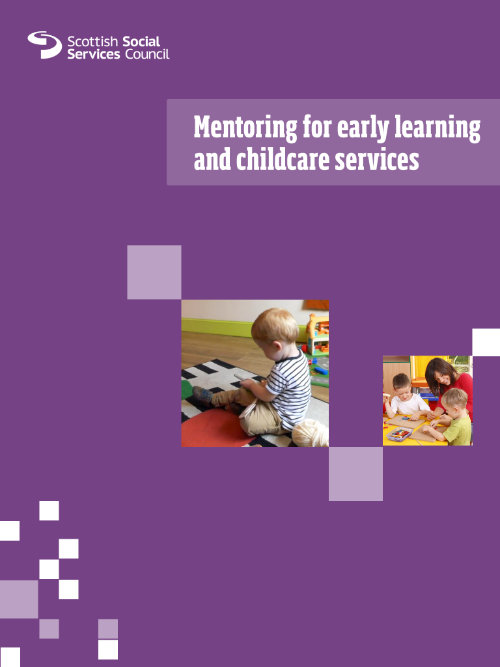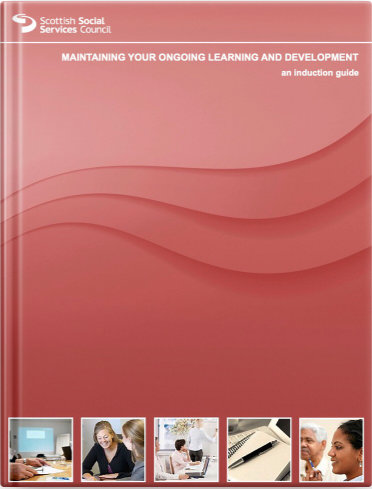In this thing, you’ll develop your knowledge of how to support people to learn and put their learning to use.
Open Badge information
Open Badge: SSSC 23 Things TEC – Thing 7: Supporting others’ learning

Counts towards: Using specialised equipment badge

Introduction
Maintaining your own ongoing learning and development is vital to improving the way you support people, develop yourself and your career, and make the best possible contribution to the work of your organisation. As well as being aware of how important it is to take responsibility for your own learning and development, it’s important to recognise how we can all support the learning of others.
Most of us can all think of times when we’ve learned something really important from a friend or colleague and how important their support was in helping us put that learning into practice. In working with Technology Enabled Care, there’s no doubt we all have a lot to learn and that we continually need to refresh that learning as the technology develops. If we are committed helping people to live as independently as possible it’s important that we share our learning, not just with colleagues, but with people who use services.
In this section, we’re going to look at how we can support other’s to learn and help them make that learning part of their day to day routine.
Mentoring and Coaching
Mentoring is an increasingly popular tool for supporting personal and professional development. It describes a relationship where a more experienced person uses their greater knowledge and understanding of the work or workplace to support the development of a more inexperienced person. Anyone can be a mentor if they have something to pass on and the skills, time and commitment to do it.
A mentoring role is different from the role of line manager and assessor, and often presents a useful way for workers to gain support for their learning.
The use of coaching as a tool to support personal and professional development is also increasing. It may be part of supervision though is more usually used as a separate form of support for workers. The aim is to help people to learn and develop.
Coaching is best described as developing a person’s skills and knowledge so that their job performance improves. It usually lasts for a short time and focuses on specific skills and goals.
This table highlights the differences between mentoring and coaching, though they often overlap.
| MENTORING | COACHING |
| Ongoing relationship that can last for a long time. | Relationship generally has a short amount of time. |
| Can be more informal and meetings can take place as and when the mentee needs some guidance and or support. | Generally more structured and meetings scheduled on a regular basis. |
| More long-term and takes a broader view of the person. Often known as the ‘mentee’ but also ‘client’ or ‘mentored person’. | Short-term (sometimes time bound) and focuses on specific development areas/issues. |
| Mentor usually passes on experience and is normally more senior in organisation. | Coach doesn’t usually need direct experience of person’s job role. |
| The focus is on career and personal development. | Focus generally on development and issues at work. |
| The mentee usually sets the agenda with the mentor providing support and guidance to prepare them for future roles. | Agenda focuses on achieving specific, immediate goals. |
| Revolves more around developing the mentee professionally. | Revolves more around specific development areas/issues. |

You’ll find much more in our Mentoring for early education and child care eBook. Although written for early years workers, the content is applicable, no matter where you work.
Supervision
Supervision may also offer opportunities to support others’ learning. Supervision aims to achieve a number of things and is often misunderstood. It has huge potential for helping with your development as well as ensuring that your organisation achieves its objectives. The tasks of supervision can be examined in relation to four main areas: quality assurance; learning and development; support; shared decision-making. In this case we’re most interested in its potential to support learning by,
- Sharing and facilitating the development and implementation of your personal and professional development plan (this belongs to all four areas of supervision).
- Enhancing and assessing your knowledge, skills, values and understanding.
- Promoting reflective practice.
- Optimising your practice in relation to personalisation.
- Ensuring you and your organisation keep up-to-date and explore new ways of working.
Formal supervision most often takes place in a one to one situation between worker and supervisor. There are also other forms of supervision, such as group supervision where a manager can deal with issues facing a whole team, and peer supervision where team members offer support and guidance to one another.
Supervision may also be informal. Informal supervision takes place regularly in the workplace. You have a discussion about practice with your supervisor / line manager as part of your every day work; you are ‘shown the ropes’ by a more experienced colleague, or, you discuss a difficult situation on a shift with your supervisor – these are all examples of informal supervision.
Supervision is a vital part of a person’s learning and development and individual, pre-arranged supervision is usually the way that organisations fulfil their formal responsibilities to workers.

You’ll find more information on Maintaining your learning and development in this eBook: https://lms.learn.sssc.uk.com/course/view.php?id=29
Instructions
a) Putting it into practice.
- As you can see, there are several ways you can support the learning of others. Looking at the options out lined here, which of these options could you use to support colleagues’ learning? How would you propose to set this up?
- Which of these options do you think would fit best when supporting people who use services and/or their carers to learn how to make the most of technology to support their independent living?
b) Your digital experience.
Think about your own experience of learning on the job. What have been the most positive and least positive experiences so far and why? Most importantly, think about what you learned and how you learned it.
c) Blog.
Write a blog entry of at least 200 words reflecting on the above activities –
- Describe a situation where you have used any of the features of mentoring, coaching or informal supervision to help a colleague learn something new.
- What have been the most positive and least positive learning experiences so far and why?